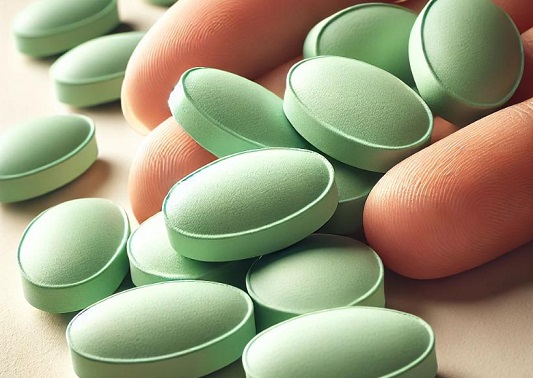Thailand medical researchers leverage 3D printing to produce tablets containing Mucuna extract to treat erectile dysfunction
Nikhil Prasad Fact checked by:Thailand Medical News team Aug 18, 2024 1 year, 5 months, 3 weeks, 2 days, 17 hours, 42 minutes ago
Thailand Medical News: Researchers from Chiang Mai University have made significant strides in the treatment of erectile dysfunction (ED) by using cutting-edge 3D printing technology to develop tablets containing Mucuna extract. This breakthrough not only represents a promising natural alternative for ED management but also showcases the potential of 3D printing in pharmaceutical development. This
Thailand Medical News report delves into the study, its findings, and what it means for the future of ED treatment.
 Thailand medical researchers leverage 3D printing to produce tablets containing Mucuna
Thailand medical researchers leverage 3D printing to produce tablets containing Mucuna
extract to treat erectile dysfunction
The Rise of Erectile Dysfunction and the Need for New Treatments
Erectile dysfunction, commonly known as ED, is a condition where men are unable to maintain a firm erection during sexual activity. The condition affects millions of men worldwide, with estimates suggesting that by 2025, over 300 million men will be impacted. Traditional treatments for ED often involve lifestyle changes or medications such as sildenafil (Viagra) and tadalafil (Cialis), which work by enhancing blood flow to the penis. However, these medications can have side effects and are not suitable for all patients, particularly those with underlying health conditions.
The researchers from Chiang Mai University decided to address these concerns by developing a new form of ED treatment that leverages the natural properties of Mucuna extract. The study was conducted by a team from the Department of Pharmaceutical Sciences, the Biomedical Engineering Institute, and the Department of Chemistry, all at Chiang Mai University-Thailand.
Mucuna Extract: A Promising Natural Remedy
Mucuna pruriens, commonly known as velvet bean, is a tropical legume known for its high concentration of levodopa, a precursor to dopamine, which plays a critical role in sexual arousal and erectile function. Previous studies have shown that Mucuna extract can enhance male sexual potency by increasing the production of nitric oxide (NO) and regulating cyclic guanosine monophosphate (cGMP) levels - key factors in achieving and maintaining an erection.
The researchers at Chiang Mai University recognized the potential of Mucuna extract in treating ED and sought to develop a sustained-release tablet that could provide a more consistent and prolonged therapeutic effect compared to conventional medications. However, the semisolid nature of Mucuna extract posed a significant challenge in formulating it into a stable tablet form.
The Power of 3D Printing in Pharmaceutical Development
To overcome this challenge, the research team employed semisolid extrusion 3D printing, a technique particularly suited for producing tablets with complex formulations. This method allowed them to precisely control the composition and release rate of the active ingredients in the tablets. The 3D printing process involved creating a semisolid slurry of Mucuna extract mixed with polymers such as Eudragit RS PO and polyvinyl alcohol (PVA), whic
h served as the matrix for the sustained-release tablets.
The researchers used a design of experiments (DoE) approach to optimize the formulation. They identified key factors that influenced the printability and release characteristics of the tablets, including the polymeric solid percentage content (PSPC) and the Eudragit-PVA ratio. Through this method, they developed a tablet formulation that achieved the desired levodopa release rate, ensuring that the active ingredients were consistently delivered over a prolonged period.
Key Findings: A Breakthrough in ED Treatment
The study's findings were remarkable. The optimized tablet formulation demonstrated a sustained release of levodopa, which is crucial for maintaining therapeutic levels of the drug in the bloodstream over time. The release profile of the tablets was carefully calibrated to meet the criteria set by the United States Pharmacopeia (USP) for similar extended-release medications.
The researchers found that the ideal formulation contained a PSPC of 58.8% and a Eudragit-PVA ratio of 2.87:1. This combination resulted in a tablet that could release the active ingredients at a controlled rate, providing a consistent therapeutic effect for up to six hours. This sustained release could potentially allow patients with ED to engage in sexual activity without the need for advance planning, improving their quality of life.
The use of 3D printing also ensured that each tablet was produced with high precision, minimizing variations in drug content and release rates. This level of consistency is crucial for patient safety and treatment efficacy.
Implications and Future Directions
The success of this study has significant implications for the future of ED treatment. By harnessing the power of 3D printing, researchers can develop highly customized medications that meet the specific needs of individual patients.
This approach could lead to more effective treatments with fewer side effects, particularly for patients who cannot tolerate traditional ED medications.
Moreover, the use of natural extracts like Mucuna offers a promising alternative for patients seeking more holistic treatment options. The study team demonstrated that it is possible to combine traditional medicine with modern technology to create innovative solutions for common health issues.
Conclusion
The development of 3D-printed tablets containing Mucuna extract represents a significant advancement in the treatment of erectile dysfunction. This study not only highlights the potential of Mucuna as a natural remedy for ED but also showcases the transformative impact of 3D printing on pharmaceutical development.
The study findings were published in the peer-reviewed journal: Plants.
https://www.mdpi.com/2223-7747/13/16/2294
For more on medical and research innovations in Thailand, keep on logging to
Thailand Medical News.
Read Also:
https://www.thailandmedical.news/news/thailand-medical-researchers-discover-that-mulberry-leaf-extract-shows-potential-in-the-fight-against-covid-19
https://www.thailandmedical.news/news/thailand-medical-researchers-discover-black-rice-anthocyanins-may-fight-alzheimer-s-disease
